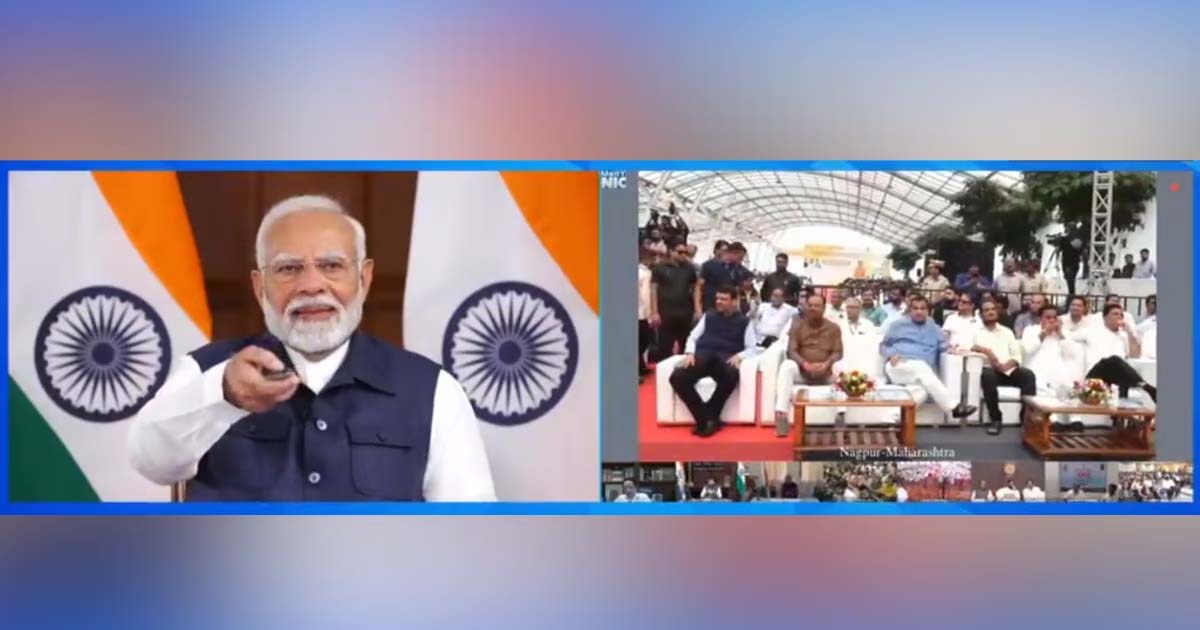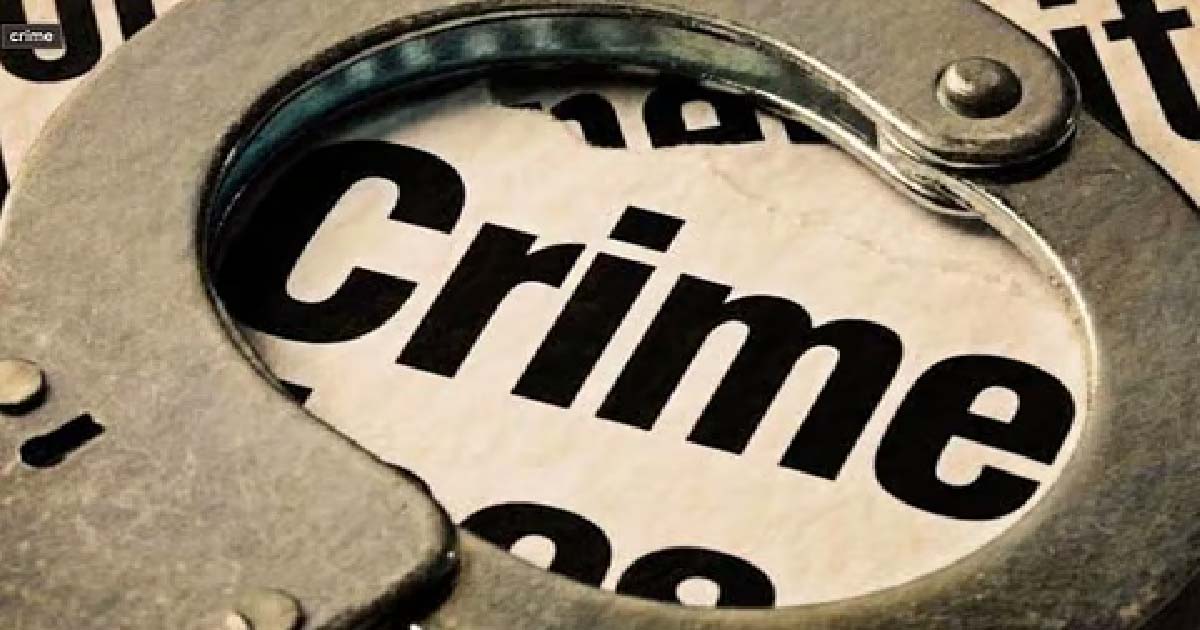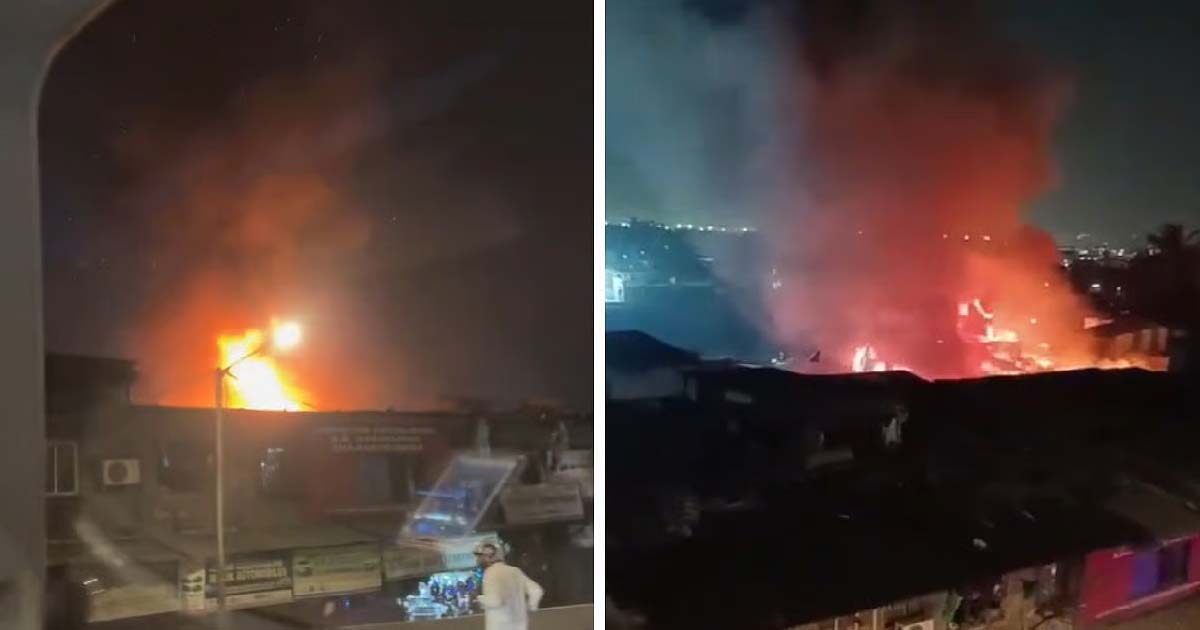Maharashtra
PM Narendra Modi Virtually Launches Projects Worth Rs 7600 Crore In Maharashtra

New Delhi: Prime Minister Narendra Modi laid the foundation stone of various development projects in Maharashtra worth over Rs 7600 crore on Wednesday through video conference.
In his speech during the initiation of the projects, PM Modi said, “Development projects worth thousands of crores have been launched in various districts, with metro expansions in several cities, airport upgrades taking place in some locations, and road and highway-related projects progressing rapidly. Projects related to infrastructure, solar energy, and textile parks have been initiated. New initiatives have been taken for the benefit of farmers and livestock owners.”
“The foundation for the country’s largest container port, Vadhavan Port, has been laid in Maharashtra. Never before in Maharashtra’s history has such rapid and large-scale development occurred across so many sectors,” PM Modi asserted.
PM Modi Speaks On Govt’s Efforts For Skilling The Youth Of The Country
Highlighting the government’s efforts for skilling, PM Modi said that the government is focusing on skilling the youths of the country.
“Today, major countries around the world see India as a significant hub of human resources. Our youth have immense opportunities in every field, from education and healthcare to software, across the globe. That is why we are equipping our youth with skills according to global standards,” PM said in Hindi.
About Babasaheb Ambedkar International Airport
PM Modi laid the foundation stone of the upgradation of Babasaheb Ambedkar International Airport, Nagpur with a total estimated project cost of around Rs 7000 crore.
It will serve as a catalyst for growth across multiple sectors, including manufacturing, aviation, tourism, logistics, and healthcare, benefiting Nagpur city and the wider Vidarbha region, as per the official statement.
The Prime Minister also laid the foundation stone of the New Integrated Terminal Building at Shirdi Airport worth over Rs 645 crore. It will provide world-class facilities and amenities for the religious tourists coming to Shirdi. The construction theme of the proposed terminal is based on the spiritual neem tree of Sai Baba, as per the PMO’s statement.
PM launched the operationalisation of 10 Government Medical Colleges in Maharashtra located at Mumbai, Nashik, Jalna, Amravati, Gadchiroli, Buldhana, Washim, Bhandara, Hingoli and Ambernath (Thane). While enhancing the undergraduate and postgraduate seats, the colleges will also offer specialised tertiary healthcare to the people, the statement mentioned.
Prime Minister further inaugurated the Indian Institute of Skills (IIS) Mumbai, with an aim to create an industry-ready workforce with cutting-edge technology and hands-on training. Established under a Public-Private Partnership model, it is a collaboration between the Tata Education and Development Trust and the Government of India
The institute plans to provide training in highly specialised areas like mechatronics, artificial intelligence, data analytics, industrial automation and robotics among others, as per the PMO.
Going further, he also inaugurated the Vidya Samiksha Kendra (VSK) of Maharashtra.
VSK will provide students, teachers, and administrators with access to crucial academic and administrative data through live chatbots such as Smart Upasthiti, Swadhyay among others.
It will offer high-quality insights to schools to manage resources effectively, strengthen ties between parents and the state, and deliver responsive support. It will also supply curated instructional resources to enhance teaching practices and student learning, the statement said.
Maharashtra
Milind’s gangsters are a symbol of the city’s destruction, action is being taken under MPDA

Mumbai: Milind Police have taken action against Tek Shankar Dhotre, who created terror here by intimidating shopkeepers, passers-by and rickshaw drivers and collected money by threatening them. The action has been taken on the instructions of Additional Commissioner Mahesh Patil. The accused is a terror in the area. A total of 6 cases of violence against him have been registered against him for collecting money. He intimidates traders and shopkeepers and collects money from him every month. No one used to speak out against him. In such a situation, the police took the complainant into confidence and took action against him. He is a terror in Milind. After taking action under the MPDA, the accused was taken into custody and deported from Mumbai to other cities. The Mumbai Police has now started action against such goons to restore the trust of the public towards the police so that the public’s trust in the police is established and the fear of the police remains in the hearts of the goons.
Maharashtra
Mumbai Weather Update: City Continues To See Smog-Filled Morning Amid Rising Pollution; Overall AQI Remains In Unhealthy Range At 281

WETHER
Mumbai: Mumbai began its Friday with a deceptively pleasant chill, as minimum temperatures dipped just below 22°C, offering residents a brief sense of relief. However, this early coolness quickly gave way to discomfort as people stepped outside to find the city blanketed in a dense, lingering smog. Commuters heading out during peak morning hours encountered reduced visibility along with eye irritation, throat discomfort and difficulty breathing, clear signs of an atmosphere overloaded with pollutants.
What initially felt like a refreshing morning soon became yet another stark indicator of Mumbai’s steadily worsening air-quality crisis. A thick haze settled over major roads, residential complexes, commercial hubs and transit routes. With only weak winds sweeping across the region, there was little natural movement to disperse the pollutants that have been steadily accumulating throughout November.
The India Meteorological Department (IMD) reported that the city is expected to experience clear skies through the day, with temperatures likely climbing to around 33°C in the afternoon. While the mild morning chill is expected to persist over the next few days, experts noted that there is still no sign of when Mumbai’s air quality might improve. The stagnant atmospheric conditions continue to trap particulate matter close to the surface, aggravating the city’s pollution load.
On Friday, Mumbai’s overall Air Quality Index (AQI) rose to a worrying 281, placing it firmly in the unhealthy category. This spike represents a major deterioration from earlier in the month, when several neighbourhoods reported moderate or merely poor readings. The decline is now citywide, affecting coastal stretches, industrial belts and densely populated residential areas alike.
Among the worst-affected locations, the Wadala Truck Terminal recorded an alarming AQI of 395, marking it as the most polluted spot of the day. Colaba followed with a reading of 317, while Chakala reported 310, both falling within the severe category.
Prominent business zones were not spared either: Worli and the Bandra-Kurla Complex (BKC) each logged AQI levels of 310, showing how uniformly pollution has spread across Mumbai’s central, western and eastern sectors.
Some suburbs fared marginally better but still failed to reach healthy levels. Kandivali East recorded the day’s lowest AQI at 130, classified as poor. Powai stood at 200, Malad West at 210, Parel Bhoiwada at 220, and Mulund West at 237, placing all within the poor to unhealthy range.
For context, an AQI of 0–50 is considered good, 51–100 moderate, 101–150 poor, 151–200 unhealthy, and anything above 200 classified as severe or hazardous. With much of the city now above that threshold, Mumbai continues to grapple with an air-quality crisis that shows no signs of easing.
Maharashtra
Mumbai: Massive Fire Breaks Out Inside Godown In Kurla’s Kismat Nagar;

Mumbai: A major fire erupted inside a godown in Kurla West’s Kismat Nagar area on Thursday night, triggering a swift response from the Mumbai Fire Department. Videos circulating on social media showed towering flames accompanied by dense black smoke rising high above the godown, visible from several hundred metres away.
According to officials, the Brihanmumbai Municipal Corporation (BMC) Fire Brigade received an emergency call at 11:08 pm, following which multiple fire tenders were rushed to the spot. Initial assessments categorised the blaze as a Level-II fire, but as flames rapidly spread across adjoining structures, the situation escalated. By 11:44 pm, the Mumbai Fire Brigade declared it a Level-III (major) fire after the inferno engulfed nearly 10 to 12 chawl structures.
Firefighters battled the spreading flames through the night, working to prevent the blaze from reaching densely packed residential units in the vicinity. The godown where the fire originated was located within a chawl cluster, making containment especially challenging. Thick plumes of smoke blanketed surrounding localities as emergency teams attempted to bring the situation under control.
Several agencies were deployed as part of the coordinated response effort, including the BMC Fire Brigade, local police, ward officials, the Electricity Distribution Company and a 108 ambulance unit. Despite the scale of the fire and the proximity to residential structures, authorities reported no injuries so far. The cause of the blaze remains under investigation.
Meanwhile, in a separate incident late Wednesday night, a car fire on the Bandra Worli Sea Link caused major disruption to traffic. The vehicle, identified as a Honda sedan, reportedly rammed into the side barrier at high speed before catching fire. Motorists on the busy sea link were left stranded as a long traffic snarl developed, with many unsure of the cause until videos began circulating online.
Footage showed the vehicle completely charred, with firefighters working quickly to extinguish the flames. Though the fire generated thick smoke and intense heat, no casualties have been confirmed. Fire officials later stated that the blaze was brought under control after brief yet intense firefighting efforts.
-

 Crime3 years ago
Crime3 years agoClass 10 student jumps to death in Jaipur
-

 Maharashtra1 year ago
Maharashtra1 year agoMumbai Local Train Update: Central Railway’s New Timetable Comes Into Effect; Check Full List Of Revised Timings & Stations
-

 Maharashtra1 year ago
Maharashtra1 year agoMumbai To Go Toll-Free Tonight! Maharashtra Govt Announces Complete Toll Waiver For Light Motor Vehicles At All 5 Entry Points Of City
-

 Maharashtra1 year ago
Maharashtra1 year agoFalse photo of Imtiaz Jaleel’s rally, exposing the fooling conspiracy
-

 National News1 year ago
National News1 year agoMinistry of Railways rolls out Special Drive 4.0 with focus on digitisation, cleanliness, inclusiveness and grievance redressal
-

 Maharashtra1 year ago
Maharashtra1 year agoMaharashtra Elections 2024: Mumbai Metro & BEST Services Extended Till Midnight On Voting Day
-

 National News1 year ago
National News1 year agoJ&K: 4 Jawans Killed, 28 Injured After Bus Carrying BSF Personnel For Poll Duty Falls Into Gorge In Budgam; Terrifying Visuals Surface
-

 Crime1 year ago
Crime1 year agoBaba Siddique Murder: Mumbai Police Unable To Get Lawrence Bishnoi Custody Due To Home Ministry Order, Says Report












